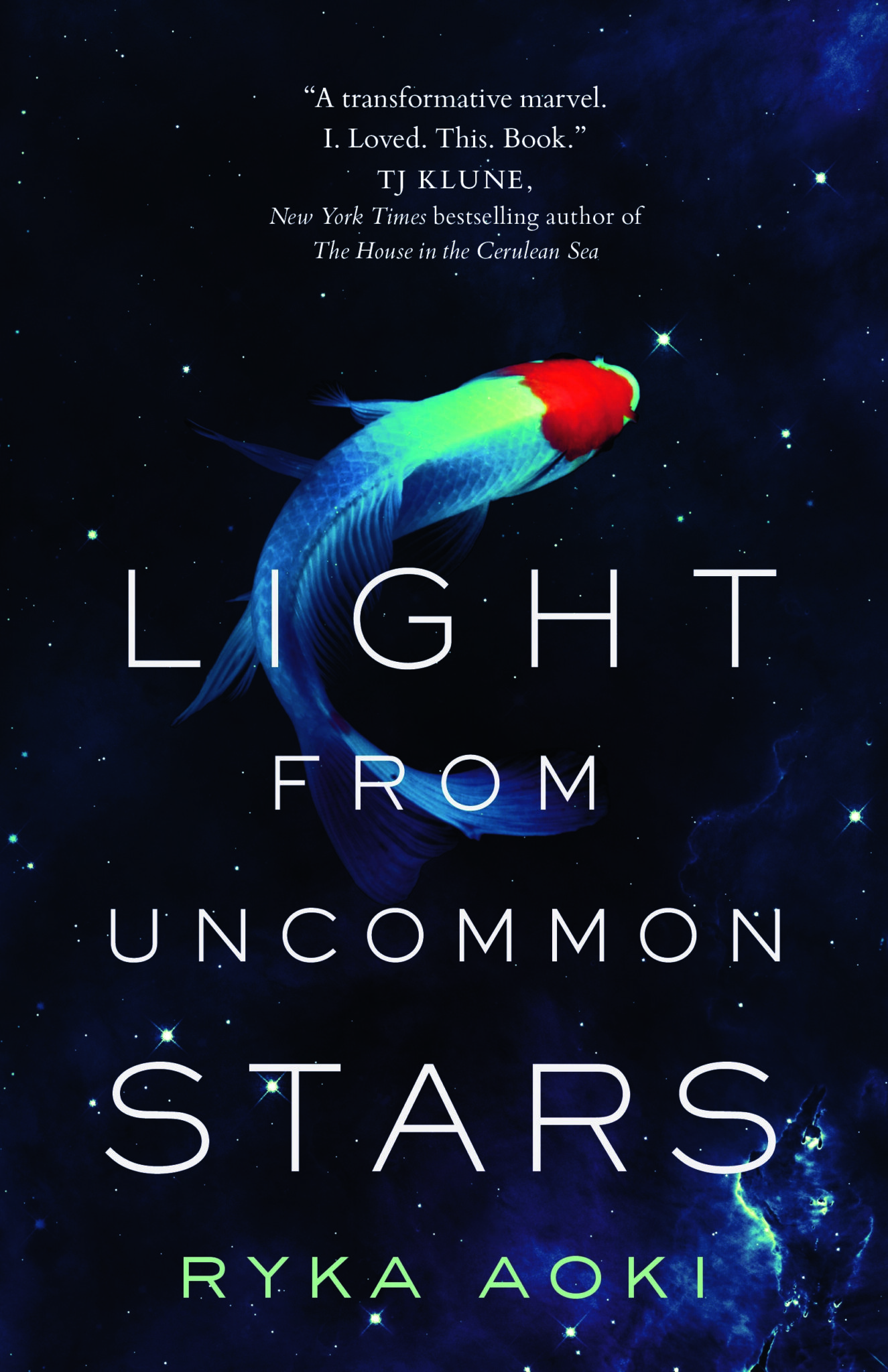Written by: Rylee Thomas
This January, on the first day of the spring semester, I walked into the Humanities Institute in the UConn library and found a mysterious young adult novel sitting smack in the middle of my desk.
It appeared with zero context; no note, no email, not so much as a passing remark. It was called Light from Uncommon Stars, and the cover was gorgeous. The rainbow-colored koi fish swimming in an ink-black sky dotted with stars immediately captured my interest.

Until the following week, I went about my life just assuming it was a cute little anonymous gift from the universe. However, my wonderful faculty mentors at the Humanities Institute later informed me that Light from Uncommon Stars was no ordinary novel. They had left it on my desk (mystery solved!) because it was, in fact, the UConn Reads selection for the 2022-2023 academic year.
(And a national bestseller, a Hugo Award finalist, a Barnes & Noble Best Science Fiction Book of 2021, and… I could go on, but my point is that the whole world adores this book, including Rick Riordan, the author of the much-beloved Percy Jackson series.)
Light from Uncommon Stars combines a trifecta of seemingly disparate genres into one of the most wholesome, magical tales ever told. The story opens with an introduction to Katrina Nguyen, a young, transgender, Chinese-Vietnamese-Mexican girl who runs away from home after her abusive parents refuse to love and accept her as a woman.
One day, Katrina is practicing her violin in the park, and legendary violinist Shizuka Satomi overhears her playing. While Shizuka knows there are other, more skilled violinists in the world, she believes no one can rival Katrina for the genuine passion she pours into her music. So, she takes Katrina on as her student. However, their relationship ultimately develops into more that of a mother and a daughter than a student and a teacher.
However… this is where the supernatural creeps into the story. Long ago, Shizuka made a deal with the devil for the success of her music career. In exchange, she must now collect the souls of seven talented young violinists, which she must deliver to Hell for all eternity.
Katrina is supposed to be soul number seven. However, when Shizuka grows to care for Katrina, she finds herself in an impossible situation. One that is made even more impossible when Shizuka meets the romantic love of her life: this would be Lan Tran, who is (a) a single mom who runs a donut shop and (b) a refugee space alien from another galaxy.
…
I KNOW, it seems all over the place. But sometimes, the most endearing family of all consists of a runaway teenage girl, her soul-stealing immortal violin teacher/mom, the violin teacher’s outer space commander donut shop-owner girlfriend, and the outer space commander’s several children (one of whom may or may not be an artificially intelligent teenage girl, who also becomes the favorite adoptive sister of our violin-playing protagonist, Katrina).
Light from Uncommon Stars tackles a lot of disheartening social issues: racism, transphobia, self-harm, sexual assault, and abuse. The plot is also pretty busy. However, Aoki devotes so much care and attention to each fragment of the narrative, leaving nothing unexplored to its fullest significance.
Despite the weighty struggles on each character’s shoulders, Light from Uncommon Stars is a ray of hope in a darkened galaxy. As harrowing as the plot becomes, it is equal parts soothing and sweet. Though I am a cisgender reader, I have it on great authority that Light from Uncommon Stars, to quote verified Goodreads author and reviewer Charlie Anders, “…really captures what it’s like to be a trans girl, especially one who’s new in her transition, in a way that I’d never quite seen on paper before.” The romance between Shizuka and Lan, too, warmed my heart.
My favorite quotes from the novel describe the Endplague, i.e., the mental collapse that, according to space commander Lan Tran, is responsible for the destruction of all intelligent civilizations throughout the history of the universe. Here they are, grouped together:
“If the Endplague was a type of despair, then it was less an affliction of the mind than of the heart. And for affiliations of the heart, did they not have anything like poetry, music, or even sappy movies with star-crossed lovers?” (280)
“Of course, the Endplague could be avoided. Life could not be avoided. Death came for everyone. But that did not mean one could not be healed. That did not mean one could not be saved.” (526)
“Tomorrow is tomorrow. Over there is over there. And here and now is not a bad place and time to be, especially when so much of the unknown is beautiful.” (280)
If you pick up this novel, expect a happy ending. Also, expect multiple points of view, intricately detailed subplots, and whimsy. I would recommend this book to fans of The House in the Cerulean Sea and Good Omens. I would also recommend it to anyone who loves music (especially the violin), donuts, science fiction, found family (across universes!), and heartbreaking yet hilarious writing. However, among all these diverse characteristics, the relationships and expressions of love between the characters are what make this story beautiful.


You must be logged in to post a comment.